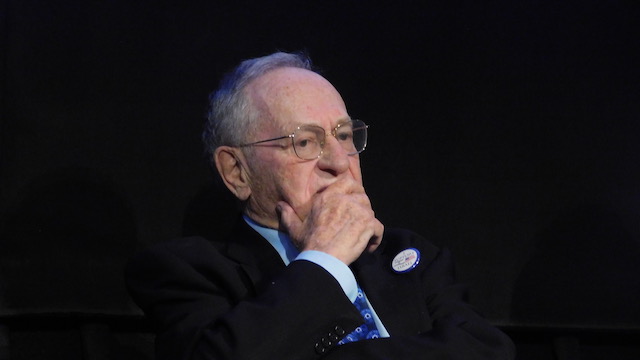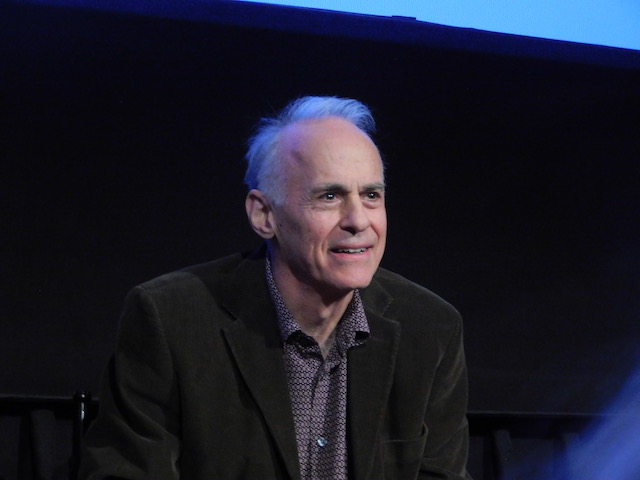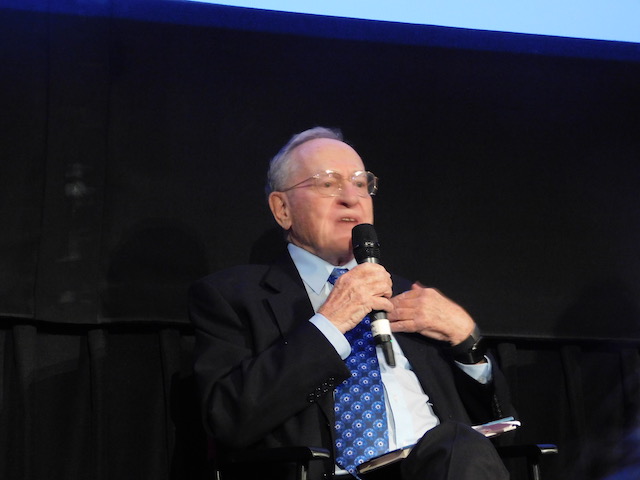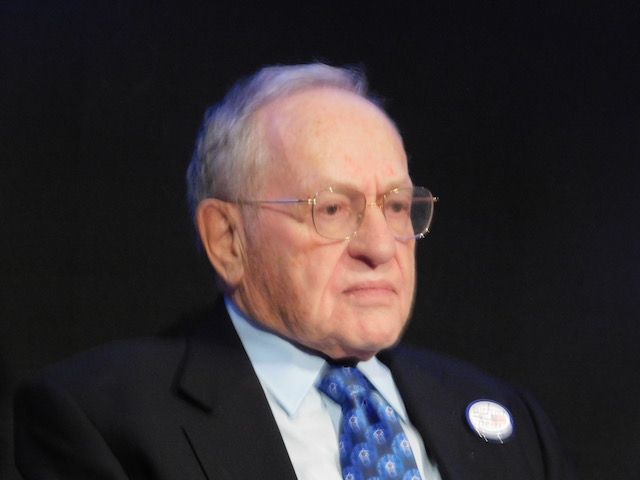
The Trials of Alan Dershowitz : Alan Dershowitz is a fierce criminal defense attorney known for representing infamous clients like Donald Trump and Jeffrey Epstein, and whose unwavering defense of constitutional rights and civil liberties is both admirable and divisive. The film explores his notable victories and lesser-known losses, as well as his court battles with one of Epstein’s victims, who’d accused him of sexual misconduct. Narrated by Dershowitz with insights from Gloria Allred, Mike Tyson, and Megan Kelly, this engaging documentary unveils a fresh perspective on the provocative and controversial lawyer.

Q: Really haven’t seen why to have a film made about you that you haven’t seen before. I know a lot about that might be one of the very few things that you’ve done. John, can you just start us off by talking about how you came to make the film?
John Curtin: I met him 10 years ago, in Miami, when he was in a hurry to get back to New York. I did a short profile on him in the beginning of 2013 but that was a 30-minute interview and later filmed with him on the Vineyard. I think maybe once in New York and that was just a six or seven minute program. I was very surprised that no one in America had done anything on this topic — he seemed to have an amazing life. I signed on in 2018, and actually got seen at Colgate University where the students were protesting, turning their backs on him. I just drove down from Montreal to Colgate to ask Alan if he would be in the film and I brought my little camera down with me. There was the first scene and it only got worse or better.
Alan Dershowitz: My only disappointment is that the film ends as if my career is over. After what’s happened in the Middle East in the last 35 days, I have devoted myself to writing a whole book called “War Against the Jews: How to End Hamas Barbarism.” Basically I just got a whole new career. I hope maybe you can edit the film and add a few more things and make it a work in progress. I’m not expecting to retire anytime soon. But thank all of you, particularly those of you who are in the film. Thank you so much for surprising me. I had no idea what you would be saying.
I never talked to you about things like this, so I didn’t really know what you thought of me. I appreciate the nuance and complexity. One of my favorite stories has been about Harry Truman who asked his attorney general to appoint a lawyer for him who had been in an accident and lost one of his arms. The AG said, “It’s wonderful of you. You want to help the handicapped.” [Truman] said, “No, no, no. I’m just sick and tired of those lawyers who tell me, ‘on the one hand.’ I want a one-handed lawyer. I’m always going to give you [the law] on the one hand. I think the movie reflects that part of me.
Q: How do you toe the line? With this insistence on the role of morality, is there somebody that you absolutely would not represent?
Alan Dershowitz: I have lots of rules. I’ll tell you about a case. I was called by a man named Ratko Mladić. He was known as “The Butcher of Bosnia” and was hiding away. He was accused of genocide so he called me from his hideout somewhere. He said, “Will you represent me?” I said, “No, I have several rules. One, I will never represent a fugitive. I believe in the justice system and I’m not going to help you escape justice. Number two, I never represent somebody who’s engaged in continuing criminal activity.”
Now, you might say, what about Trump? We’ll talk about that in a minute. So I said “No,” and added, “If you do surrender to the Hague, I’ll then talk to you a few months later.” He was caught and ended up in the Hague. He then asked me if I would come and see him. I went to see him and said, “The criminal actions that are taking place are continuing, I can’t represent you unless you can stop them.” He said, “I have no authority, I can’t stop them.” So I didn’t represent him because I don’t represent continuing criminals.
I don’t represent fugitives, but I would represent anybody unless there was a conflict of interest no matter what crime they are accused of. You can ask me the obvious question that many of you are asking. Would I represent the people of Hamas who went into Israel and beheaded, raped, murdered and burned people. In that case, I couldn’t do it because I know some of the people, some of the victims.
I’m a friend of a general who lost five people. three of them were killed and two of them are being held hostage. There are limits, but they’re not the obvious ones that you would think of. Everybody has root morality. Can you imagine somebody being told, I’m about to go in and beat my wife to a pulp and that person doesn’t call the police. Well, there’s a name for that person. He’s called the Catholic priest.
If you go into confession, you tell a Catholic priest, “I’m about to go and meet my wife,” the priest can tell you you’re going to hell, you’re going to damnation — you’re going to burn et cetera. But he can’t drop a dime on you. Lawyers have different roles regarding morality. A psychiatrist can but a priest can’t. My daughter-in-law is an emergency room doctor at a major hospital and she can’t refuse to deal with a person who might go out and commit more crimes.
There’s such a thing as absolute morality. But in a democracy where different people play different roles, there’s morality. People give me the answer all the time. Oh, in other words, You think that the concentration camp guard at Auschwitz was guilty? No, that system was a terrible system that doesn’t deserve the role of morality. But we have a great system, a wonderful system and the role of the lawyer is a very important one.
I do completely support the role of morality. But let me tell you, it’s very difficult to represent people who are terrible, terrible people. But if I can’t do it… The reason I have to do it is that I was a professor with tenure. If I say I won’t do it, I have no fear of losing my job. How can I teach my students that they have to do it?
Q: There are elements of this film that are like a true crime story, something you would see on TV. You have the drone shots and the dramatic music, but yet you’ve done a really fine job of navigating lines of morality and the trial. Talk about your process?
John Curtin: Unfortunately, the guy who helped me do this, Paul Carvalho, who was a new fellow at Harvard, died just a couple of months ago. It was through talking with Paul and his critiquing the edits we went through, that we both became incredibly familiar with Alan’s life and discussed this ad nauseam for five years. It’s a tricky story to tell. Alan’s career has just got way too much in it even for a long film like this.
Trying to pull out a few of the key events and trials in his life was very difficult. We had a lot of discussions and then, on top of that, his most difficult client he calls is Israel. How do you fit that into the mix? It was really uncommon. The only thing I was sad about was that I just couldn’t fit it. Alan’s actually written an opera about the holocaust and a great Jewish cantor came in and sang it for us. But we just couldn’t fit that in the film, which was really too bad.

Q: Did you consider or have you been asked to represent Donald Trump in any of his most recent cases?
Alan Dershowitz: I have another rule. You get me once. I don’t want to become counsel to a family. So pick your time carefully because I’m only going to represent you once. There was this professor who made it sound like I was responsible for [Trump] challenging the election and doing all the terrible things he did on January 6th, which I fundamentally disagreed with.
Of course, you then have me saying, correctly, that I would have nothing to do. He asked me to do a second case. I can tell you, I’ve been asked to do some of the current cases and my answer is, first of all, I love my wife and want to continue to have her sleep with me. I just know that if I represented Donald Trump again, but fortunately I have a rule and that rule permits me to, on principle, say no. I’m very happy with that rule because I really love sleeping with my wife.
Q: This regards the settlement you ultimately made with Virginia Giuffre, your accuser, someone who made your life so miserable all these years. You said you spent five million dollars on it.
Alan Dershowitz: That’s right.
Alan Dershowitz: First of all, it wasn’t a settlement. I gave her nothing. It was simply an agreement on her part to drop the charges, allegations and accusations against me and make that statement. I’m precluded from talking about this. I can only say that a person who totally admits I’m doing this hypothetically admits that she made up a story completely is open to some problems. She said what she said. It’s enough for me. People have to believe what they have to believe.
The evidence, as the statement says, right from the beginning, I have categorically denied and disproved it. I can just repeat here what I’ve said over and over and over again. Never met her, never heard of her, never had any contact with her. One problem is they picked on the wrong person. They might have picked on the governor, of course he’s “Randy Andy.” I’ve never done anything like this in my life — period. I love my wife and I’m totally committed to her. So, the case is resolved the way it was resolved. As I said, it cost me a fortune of money to do this. But, in the end, I had no choice. I had to make sure the truth came out.

Q: You said that you didn’t want to take Trump’s second impeachment because you didn’t want to be associated with alleging that the election was stolen. But you’re going to be associated with murder, rape and all that…How do you square that?
Alan Dershowitz: those are things that are in the past and the government has the burden of proving it. If I were to defend Donald Trump on the allegations regarding the election, I’d have to put my own self for him or two on the issue. I don’t think he would have wanted me to represent him saying, I think the election was fair. I think that Biden was legitimately elected president. I just didn’t think that would be a fit.
With murders, the government has to prove it beyond a reasonable doubt. Look at the O J Simpson case — there was a mountain of evidence, an absolute mountain. The problem was, at least some of it was tainted and by being able to prove that it had been tampered with, as the jurors told us afterward, that once we proved that everybody in the jury believed this. Once we proved that one piece of evidence had been tampered with deliberately by the government, every other piece of evidence became subject to that one. That’s why we didn’t win the OJ Simpson case — the police and the prosecution lost it.
Q: How much do you think that you’re being born and raised in Williamsburg, Brooklyn, has affected your career?
Alan Dershowitz: Born and raised there? Yeah. The questioner is Harvey Silverlake, probably one of the greatest contemporary lawyers of the last half century. I had the privilege to litigate cases with him over the years. He started when I was asked to defend a young person who planted a bomb. I didn’t know anything about how to get into a courthouse. I asked my former student at Harvard, I think you’ve shown me the courthouse and together we won the case.
We’ve won lots and lots of cases since. You have to understand the essence of this question is because he grew up in Bensonhurst and is not so sure that the Bensonhurst part of growing up was an advantage or disadvantage over Williamsburg and Morrow Park. But seriously, growing up the way I did had everything to do with my life and career. I grew up a skeptic. I doubted everything and everybody. I’m a skeptic about everything. I’m a skeptic about religion.
I’m a skeptic about non-religious. I’m a skeptic about science and about politics. Brooklyn was a place of skepticism. Brooklyn gave me a number of things. My skepticism and a sense of humor. If you want to be successful in Brooklyn, you have to be funny. I’ve often asked the question how many successful people grew up in Brooklyn. It’s remarkable. I thank the Lord that I was born in Williamsburg, moved to Borough Park at a relatively early age and stayed there through college.
Brooklyn College really made me everything I was and I owed them everything, but I won’t contribute a penny to them because they’ve turned into a bastion of anti-semitism. They will not allow me to see the political science department. I’m probably the most well known graduate from Brooklyn Colleges, Political Science Department. The students wanted me to speak there. The department said, “No, we’ve already heard from Norman Finkelstein on Israel. We don’t have to hear from you.”
So no more money to Brooklyn College. No money to Yale Law School, no money to Harvard. Nobody’s getting a single penny from me or any support from me until they have a reckoning. The reckoning that resulted after the George Floyd killing has to occur in colleges. They have to reckon with their long history of anti-semitism. The fact that Harvard in the 1930s welcomed Nazis and sent people to Nazi universities that had just fired all of their professors.
They had quota systems, et cetera. Now look what’s going on with 33 student groups the day after these massacres, rapes and beheadings. They issued a statement saying Israel was completely responsible for all of these rapes and murders. And to this day, the president of Harvard has refused to condemn those students. Until she does, do not count on my support.
John Curtin: Are you going to get over it? Are you going to ever be at Temple Emanuel again — they have not had you as a speaker. The 92nd street Y is not having you as a speaker there either. Are they going to let you back in?
Alan Dershowitz: I don’t think so. You’d think the 92nd street Y would want me to talk about my book “War against the Jews.” It’s the most obvious thing, but they won’t let me come back. 92nd Street Y and Temple Emanuel, by the way, those weren’t cancellations as a result of Trump. Those were all cancellations based on the accusation against me, which the woman now admitted she may have mistaken me for somebody else. You’d think these institutions would reconsider, but they have so much egotism and arrogance that they’re unwilling to reconsider.

